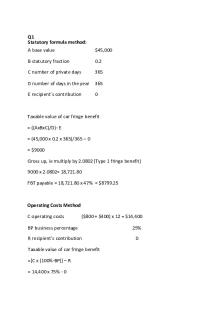Week 8 Tut Qs....... PDF

| Title | Week 8 Tut Qs....... |
|---|---|
| Author | Campbell Wansbrough |
| Course | Equity and investment analysis |
| Institution | Monash University |
| Pages | 1 |
| File Size | 66.5 KB |
| File Type | |
| Total Downloads | 25 |
| Total Views | 188 |
Summary
Tut q's for Week 8 Equities and Investment Analysis....
Description
Topic 7 Week 8 Tutorial – Behavioral Finance Q1. Describe the differences and similarities between the Prospect Theory and the conventional Expected Utility Theory. Q2. Imagine a situation where an individual needs to choose between a sure outcome and a gamble (e.g., tossing a coin, rolling a dice, etc.). Create a situation in which an individual would make different decisions under the Prospect Theory and under the Expected Utility Theory. Q3. Jill Davis tells her broker that she does not want to sell her stocks that are now below the price she originally paid for them. She believes that if she just holds on to them a little longer, they will recover, at which time she will sell them. What behavioral characteristic does Jill demonstrate? a. Loss aversion b. Regret avoidance c. Risk aversion d. Conservatism Q4. After John Dow sells his stock, he avoids following it in the media. He is afraid that it may subsequently increase in price. What behavioral characteristic does he exhibit? a. Loss aversion b. Regret avoidance c. Risk aversion d. Conservatism Q5. Match each example to one of the following behavioral characteristics: Example
Characteristic
a. Investors are slow to update their beliefs when given new evidence b. Investors are reluctant to bear losses caused by their unconventional decisions
i. Disposition effect
c. Investors are reluctant to sell stocks with “paper” losses
iii. Representativeness bias
d. Investors disregard sample size when forming views about the future from the past
iv. Regret avoidance
ii. Conservatism bias
Q6. Let’s remember one of the cases we discussed at the beginning of the course, namely, the one with GameStop (GME). Read an extract from the Forbes article that discusses the details of what has happened to GME: how the stock price surged, whether this price surge was driven by fundamentals, and how short sellers, who are generally considered to be rational, well-informed investors, were squeezed out of the market. Discuss decision-making biases that might have contributed to the GME price surge. Assuming that the GME stock was overpriced, what could have prevented short sellers from correcting the price to its fair value?...
Similar Free PDFs

Week 8 Tut Qs.......
- 1 Pages

Week 8 Tut Answers.
- 3 Pages

W7 tut Qs final - UOW FIN111
- 3 Pages

Week 7 tut - tutorial
- 2 Pages

Week 9 Tut Answers.
- 4 Pages

PR tut week 3
- 1 Pages

Week 02 Tutorial - Tut
- 2 Pages

Week 7 T - week 7 tut work
- 9 Pages

104 week 9 tut - tutorial
- 5 Pages

Week 1 scenario - Wk1 tut
- 4 Pages

FIN222 Week 10 Tut Questions
- 3 Pages

TUT activities WK 8. pdf
- 2 Pages

Tut wk 8 calculation outline
- 4 Pages

Week 8 quiz - Week 8
- 19 Pages

Week 8 questions - Week 8
- 4 Pages

TUT 4 - TUT 4
- 2 Pages
Popular Institutions
- Tinajero National High School - Annex
- Politeknik Caltex Riau
- Yokohama City University
- SGT University
- University of Al-Qadisiyah
- Divine Word College of Vigan
- Techniek College Rotterdam
- Universidade de Santiago
- Universiti Teknologi MARA Cawangan Johor Kampus Pasir Gudang
- Poltekkes Kemenkes Yogyakarta
- Baguio City National High School
- Colegio san marcos
- preparatoria uno
- Centro de Bachillerato Tecnológico Industrial y de Servicios No. 107
- Dalian Maritime University
- Quang Trung Secondary School
- Colegio Tecnológico en Informática
- Corporación Regional de Educación Superior
- Grupo CEDVA
- Dar Al Uloom University
- Centro de Estudios Preuniversitarios de la Universidad Nacional de Ingeniería
- 上智大学
- Aakash International School, Nuna Majara
- San Felipe Neri Catholic School
- Kang Chiao International School - New Taipei City
- Misamis Occidental National High School
- Institución Educativa Escuela Normal Juan Ladrilleros
- Kolehiyo ng Pantukan
- Batanes State College
- Instituto Continental
- Sekolah Menengah Kejuruan Kesehatan Kaltara (Tarakan)
- Colegio de La Inmaculada Concepcion - Cebu